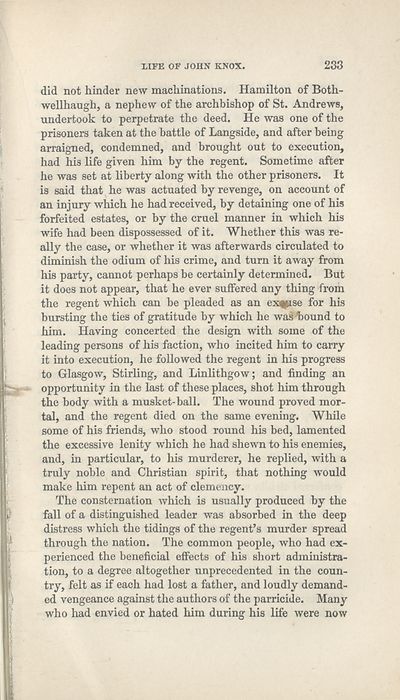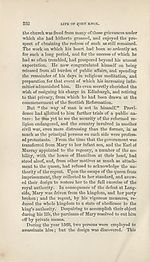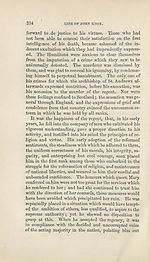Download files
Complete book:
Individual page:
Thumbnail gallery: Grid view | List view

LIFE OF JOHN KNOX.
233
did not hinder new machinations. Hamilton of Both-
wellhaugh, a nephew of the archbishop of St. Andrews,
undertook to perpetrate the deed. He was one of the
prisoners taken at the battle of Langside, and after being
arraigned, condemned, and brought out to execution,
had his life given him by the regent. Sometime after
he was set at liberty along with the other prisoners. It
is said that he was actuated by revenge, on account of
an injury which he had received, by detaining one of his
forfeited estates, or by the cruel manner in which his
wife had been dispossessed of it. Whether this was re¬
ally the case, or whether it was afterwards circulated to
diminish the odium of his crime, and turn it away from
his party, cannot perhaps be certainly determined. But
it does not appear, that he ever suffered any thing from
the regent which can be pleaded as an ex^se for his
bursting the ties of gratitude by which he wasAiound to
him. Having concerted the design with some of the
leading persons of his faction, who incited him to carry
it into execution, he followed the regent in his progress
to Glasgow, Stirling, and Linlithgow; and finding an
opportunity in the last of these places, shot him through
the body with a musket-ball. The wound proved mor¬
tal, and the regent died on the same evening. While
some of his friends, who stood round his bed, lamented
the excessive lenity which he had shewn to his enemies,
and, in particular, to his murderer, he replied, with a
truly noble and Christian spirit, that nothing would
make him repent an act of clemency.
The consternation which is usually produced by the
fall of a distinguished leader was absorbed in the deep
distress which the tidings of the regent’s murder spread
through the nation. The common people, who had ex¬
perienced the beneficial effects of his short administra¬
tion, to a degree altogether unprecedented in the coun¬
try, felt as if each had lost a father, and loudly demand¬
ed vengeance against the authors of the parricide. Many
who had envied or hated him during his life were now
233
did not hinder new machinations. Hamilton of Both-
wellhaugh, a nephew of the archbishop of St. Andrews,
undertook to perpetrate the deed. He was one of the
prisoners taken at the battle of Langside, and after being
arraigned, condemned, and brought out to execution,
had his life given him by the regent. Sometime after
he was set at liberty along with the other prisoners. It
is said that he was actuated by revenge, on account of
an injury which he had received, by detaining one of his
forfeited estates, or by the cruel manner in which his
wife had been dispossessed of it. Whether this was re¬
ally the case, or whether it was afterwards circulated to
diminish the odium of his crime, and turn it away from
his party, cannot perhaps be certainly determined. But
it does not appear, that he ever suffered any thing from
the regent which can be pleaded as an ex^se for his
bursting the ties of gratitude by which he wasAiound to
him. Having concerted the design with some of the
leading persons of his faction, who incited him to carry
it into execution, he followed the regent in his progress
to Glasgow, Stirling, and Linlithgow; and finding an
opportunity in the last of these places, shot him through
the body with a musket-ball. The wound proved mor¬
tal, and the regent died on the same evening. While
some of his friends, who stood round his bed, lamented
the excessive lenity which he had shewn to his enemies,
and, in particular, to his murderer, he replied, with a
truly noble and Christian spirit, that nothing would
make him repent an act of clemency.
The consternation which is usually produced by the
fall of a distinguished leader was absorbed in the deep
distress which the tidings of the regent’s murder spread
through the nation. The common people, who had ex¬
perienced the beneficial effects of his short administra¬
tion, to a degree altogether unprecedented in the coun¬
try, felt as if each had lost a father, and loudly demand¬
ed vengeance against the authors of the parricide. Many
who had envied or hated him during his life were now
Set display mode to:
![]() Universal Viewer |
Universal Viewer | ![]() Mirador |
Large image | Transcription
Mirador |
Large image | Transcription
| Antiquarian books of Scotland > Scotland/Scots > Life of John Knox ; and, The life of Alexander Henderson > (251) |
|---|
| Permanent URL | https://digital.nls.uk/131835316 |
|---|
| Description | Thousands of printed books from the Antiquarian Books of Scotland collection which dates from 1641 to the 1980s. The collection consists of 14,800 books which were published in Scotland or have a Scottish connection, e.g. through the author, printer or owner. Subjects covered include sport, education, diseases, adventure, occupations, Jacobites, politics and religion. Among the 29 languages represented are English, Gaelic, Italian, French, Russian and Swedish. |
|---|

